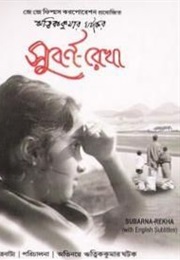
In 1947 when the British left India, the country was divided into two separate states. One being Muslim Pakistan and the other being Hindu India. This was called the partition of India and resulted in the displacement of millions of people along religious lines. Starving refugees and ethnic violence ensued. Up until today its effects are still being felt with spurts of violence popping up occasionally.
Clearly , this was a traumatic event for the people who lived through it. The great Indian director Ritwik Ghatak was one of those people effected and he would throughout his film catalogue (he only directed eight feature films), show the effects of these events on regular people.
His film Subarnarekha (which is a river running through West Bengal) tells one such sad tragic story. Ishwar Chakraborty (Abhi Bhattacharya in a sublime and poetic performance) is an educated Bengal refugee from East Pakistan. At a Bengal refugee camp, he befriends the idealistic Haraprasad, who wants to claim the land at the camp for his fellow displaced Bengals. Ishwar is also accompanied by his little sister Sita and it is assumed that their parents died during the partition. He is a young adult and she is a small child. In addition, they witness a woman forcefully taken away by thugs, leaving her young son Abhiram alone. Ishwar immediately without thought for himself takes the poor boy in. Right at the beginning we are shown that Ishwar is a good man with deep and honorable morals and I immediately liked him.
The movie then goes on to show how circumstances and culture can turn even the best of us into heathens. Meeting an old university friend who is also a rich factory owner, gets Ishwar hired as a manager in the factory, situated in a far away small village. Taking both Sita and Abhiram to this village, he believes he has the beginning of a good life.
Sita and Abhiram love each other as children and when Sita grows up into a beauty, their childhood love turns into something else. The problem is that Indian culture was ingrained, even today, in a caste culture that is based on the family you were born to, which ranks people from high to low, and based on their caste. Abhiram it is discovered was born to low caste, while Sita and Ishwar came from the educated and highest teacher caste. The Hindu religion forbids interbreeding between the castes. This is the culture that will slowly change and destroy Ishwar’s world, making this an extremely sad film. Ghatak takes great pains in showing Ishwar’s ascent and then descent as a matter of fact occurrence without even a thread of melodrama shown. The result gives an even sadder and more tragic tone to the entire movie. I like sad movies, if they are true and faithful to their characters, which, “Subarnarekha”, certainly is.
Ghatak has a way of showing us emotions without words through glances and expressions of the people in his story. We know that Sita loves Abhiram through a quick smile she gives when told by Ishwar that he will accompany them to their new home, and then later as a teenager her silent pouting when told he will leave to Calcutta to study. The acting by the entire cast is superb, with Battacharya giving an inclusive performance that made me feel that he inhabited the soul of his character.
One extremely Indian element to the film, is having the grown up Sita develop into a singer and having her sing a few songs within the story. I did not think that the music was appropriate for the theme and message being told, but to Ghatak’s credit, he has her sing as a real person would sing and not like a fantasy accompanied by an orchestra. He was probably told by his producers to add the music into the movie, and I could have done without it.
Even with the music interludes, the movie held my interest throughout. From its refugee camp beginning and up until its poignant and hopeful ending. This is a human drama of the finest order that gives its viewers a glimpse into the lives of the Indian people, and their struggles to build an honorable nation and a livable world. It is a great example of World Cinema at its best.

